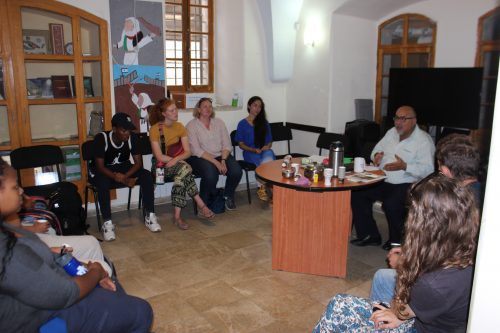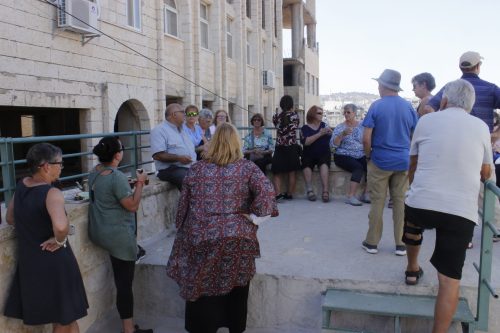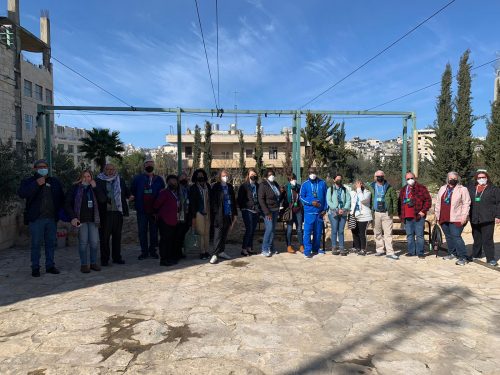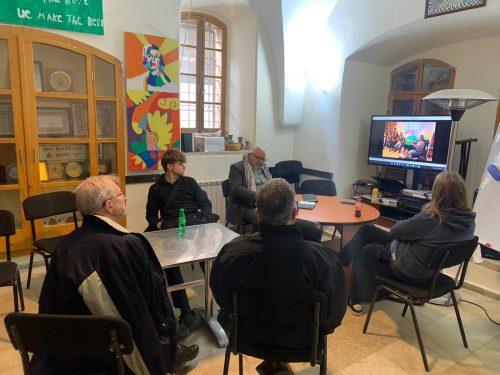Since March 5th of 2020, Bethlehem has seen a profound absence of pilgrims and tourists. With an economy largely based in the tourism industry, this has had a devastating effect on the community, with many families suffering financially.
Wi’am is so glad to see tourists and pilgrims starting to return to Bethlehem, and we are ramping up our programming for guests again, as we start hosting more groups and individuals from around the world.
We are engaging with different individuals and groups, keeping visitors informed about the Palestinians’ situation, the Christian Community, the interfaith dialogue, Human rights , and promoting nonviolent resistance as an example…….
We started with alternative tourism early on as individuals, when Zoughbi was in student government and working at the Ecumenical Institute for Theological Studies (Tantour), and then when he worked with the Middle East Council of Churches as well as Mid East Witness, an organization parallel to witness for peace in Nicaragua, sponsored by the International Fellowship of Reconciliation. We brought all of this experience to Wi’am through a program called alternative tourism, also called citizen diplomacy or people-to-people diplomacy, where we host individuals, families, and groups, introducing them to important aspects of the Bethlehem area.
We introduce our guests to the Holy Stones (churches and important religious sites), the Rolling Stones (the socioeconomic and political conditions we are living under), and the Living Stones (the people of the Holy Land), in Bethlehem. There is a quote attributed to St. Jerome that illustrates the importance of living stones, and learning from the people of the land: “Five gospels record the life of Jesus. Four you will find in books and the one you will find in the land they call Holy. Read the fifth gospel and the world of the four will open to you.” As the context of the Bible shapes the meaning we see in it, so our context in Bethlehem shapes the mission of Wi’am. We are acted upon by our context, and we must also act on our context, responding to it intentionally. We hope that you will gain deeper understanding through visiting Bethlehem.
Of course, we also have programs beyond alternative tourism excursions. We host exchange visits, which allow people to gain first-hand knowledge of the situation and understand the context we live in. Wi’am also has solidarity visits and advocacy work, through which we hope to introduce others to the empowerment and steadfastness which are the results of such activities. If you would like, groups are also welcome to come for interdisciplinary trainings at Wi’am. We have hosted many groups from Europe, Africa, North America, and Asia, covering topics such as human security, compassionate listening, Sulha (traditional methods of conflict mediation and reconciliation), comparative mechanisms and schools of mediation and schools of thoughts, interfaith dialogue, conflict transformation, trauma awareness and recovery, cultural tips, and skills for inclusivity and pluralism, among others.
Now, Wi’am is embarking on more calls for visits to The Holy Land especially Bethlehem, to meet with the people and to see the situation, and we are prepared to provide all the services needed to make any delegations, whether individuals or groups, more understanding, more fruitful, and more helpful. We are not asking people to be in our shoes for life, but to walk a few miles, and we are also committed to walk in their shoes with smiles for miles and miles.
Please come visit anytime. If you need more information or if you have more questions, please contact zoughbi@alaslah.org, or visit our website for more information.
All of you are welcome, there is room in the inn!
Zoughbi Zoughbi / Wiam Center




